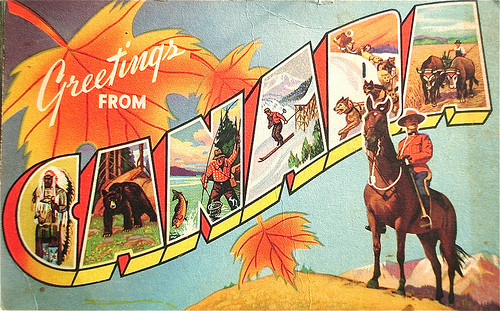
Image: public domain
OTTAWA, Ont. — Monday, October 19, 2015 was a day for the history books, as Canadians went to the polls to vote for who would lead the country for the next four years. This campaign was the longest and also the most expensive that Canada has ever seen.
Canada has three major political parties. On the right is the Conservative Party of Canada, the current ruling party, led by Stephen Harper. They came to power in 2006, and Harper served as Prime Minister for 10 years, winning three consecutive elections before being defeated this week.
The most recent opposition party is the New Democratic Party of Canada (NDP) led by Thomas Mulcair. It is the left-of-centre option, and rose rose to the position of official opposition for the first time in 2011. Somewhere down the middle is the Liberal Party of Canada, led by Justin Trudeau. The Liberals fell hard from grace after the 2011 election, finishing with only 19% of the popular vote, an all time low for the party. As a result, they left the official opposition position to the NDP.
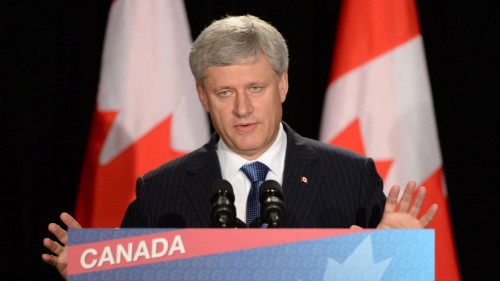
Prime Minister Stephen Harper [Photo Credit: Canadian Press]
The elder Trudeau is remembered as Canada’s most charismatic and revolutionary leaders. He led the Liberal Party and served as Prime Minister, from 1968 – 1979 and again from 1980-84. He was an outspoken leader who dated high profile women, loved to canoe and caused media frenzies. He was photographed doing pirouettes at important events and giving the one-fingered salute to protesters. He married the beautiful and much younger Margaret Sinclair, and had three sons. Justin is the oldest, born December 25, 1971.
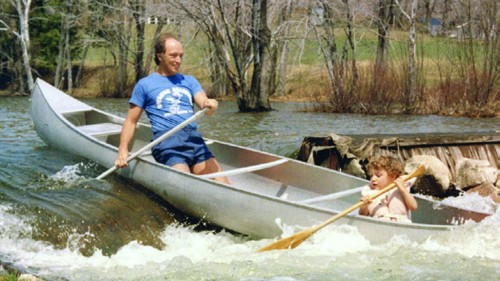
A young Justin Trudeau canoes with his Father, the late Pierre Trudeau [Public Domain]
Twice Harper prorogued Parliament, in 2008 and then again in 2009, holding up proceedings that he felt threatened and criticized his government. These were the only two times that this had ever happened in Canadian history. In March 2011, Harper refused to disclose the costs of big-ticket programs and, subsequently, became the first Canadian Prime Minister to be found in contempt of Parliament.
Harper will be remembered internationally for muzzling scientists and shutting down world-class scientific studies, such as the Experimental Lakes Project (ELA). He will also be remembered for losing Canada’s seat on the UN Security Council; for his insistence in pushing through the Keystone XL pipeline; for his failure to rise to the Syrian refugee crisis and the list goes on.
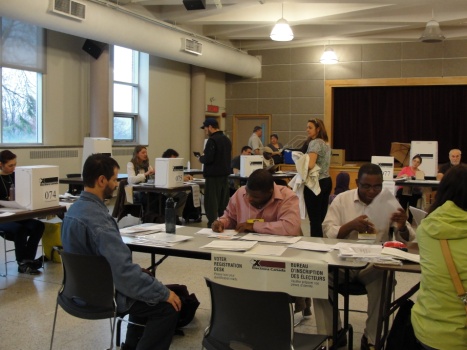
A Canadian polling station on Election Day, October 19, 2015 [Photo Credit: Elections Canada]
In the end, the liberals won a majority government with 184 seats.The NDP was crushed, only taking 44 seats and losing the title of opposition party to the outgoing Conservatives, who took 99 seats. Ten seats went to the Quebec based Bloc Quebecois and the Green Party took one lone seat, which is held by its national leader Elizabeth May.
But the drama did not end there. Before the night was over, Stephen Harper resigned as leader of the party, choosing to stay on as a member of Parliament, representing his home riding of Calgary Heritage in Alberta. This news was sent out as a press release by Conservative Party president John Walsh, just as Harper took the stage to make his concession speech. The news spread like wildfire across social media.
So who is this new Prime Minister Justin Trudeau? Do Canadians like him? Do Canadian Pagans like him? Popular horror writer and Toronto Pagan Pub Moot organizer Karen Dales, from Toronto, Ontario, had this to say:
I find it interesting that when referring to our new PM we are calling him Justin, not Trudeau. We never called Harper by his first name, we never called Paul Martin, Paul. We never called any of our PM’s by their first name. Now we are doing so with Justin. When one calls another by their first name, it breeds familiarity and friendship–connection. I think this in itself marks a change in how the people of Canada relate/connect with our PM.
Maybe it is because Justin Trudeau grew up in the public eye, we know him. When his younger brother, Michel died tragically in a skiing accident, we mourned with the family. When Pierre Trudeau died, political divisions were set aside and the entire country grieved.
![Justin Trudeau [Photo Credit: Alex Guibord / Flickr]](https://wildhunt.org/wp-content/uploads/2015/10/14578663236_f8e44875db_b-500x408.jpg)
Justin Trudeau [Photo Credit: Alex Guibord / Flickr]
I feel that this change will bring a new openness and inclusiveness to the government. Now the issues that they need to focus on are rebuilding our economy, getting rid of many of the repressive and xenophobic laws supported by the old government, and keeping their promises.
Across the country in Prince George, British Columbia, Pagan Andrew Burton is also feeling reflective about change. Burton, who runs a youth theatre group called Street Spirits, campaigned to be elected to his local school board last October. Despite not being elected, Burton remains active in his community. He said:
I am optimistic about the change in government. A friend of mine (an MLA in Manitoba) once said: “Change is a good thing. After you’ve been in power for a while you start to think you own it.” We need a fresh approach and a thoughtful agenda. At the same time It troubles me that people seemed to be voting against Harper rather than for a particular candidate in their riding. We need to be voting for a capable voice in parliament and a positive vision rather than to kick the scoundrels to the curb.
In Burnaby, British Columbia, Pagan podcaster, Sparrow, of The Wigglian Way, got to work ensuring that things ran smoothly at her local polling station. She shared:
I volunteered as a “candidate representative” for Lynne Quarmby, Green Candidate for Burnaby North-Seymour. I arrived at the polling station at 6:30 am so that I could observe that the ballot boxes were empty and sealed correctly. Next, I looked at all the ballots to be sure that they were not marked on the front in any way shape, or form and to be sure they were initialed by the Deputy Returning Officer at each station.
It was my job to observe the area for any shenanigans. Every hour I checked behind all the voting screens to be sure there were no markings on the instructions or screens themselves. As each voter’s name was announced I would cross it off a voter list to be sure that no one was voting again. At the end of the voting day, representatives of each candidate witnessed the counting of the votes at each poll. We stayed until all the ballots were counted. The rejected or “spoiled” ballots were also counted and all were logged. We did not leave the locked room until everything was sorted and accounted for.
I was surprised that there were not more volunteers throughout the day. I was the only candidate representative that was present all day. At the end of the day, I went for a very well earned Chili Stout. Cheers Canada! We Heaved Steve!
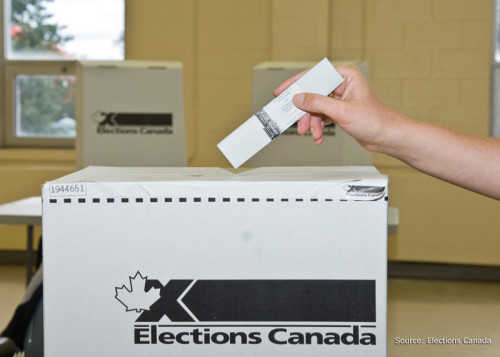
[Photo Credit: Elections Canada]
Many Canadian Pagans and Heathens have been concerned that the Harper government’s “Barbaric Cultural Practices Act” could be used to persecute various forms of Pagan ritual and practice and could be a gateway to a modern Witch hunt. Dales expressed relief that the election results may change this:
Canada spoke true and with hope on October 19th. No longer will we Pagans be worried that a neighbour is calling to report our practices–which are protected in the Charter of Rights–as barbaric. We Canadians said that we will not tolerate bigotry, fear-mongering, and divisiveness.
Harper may have been what Canada needed when he was first in office, but power went to his head. Canada has hope in Justin, because we see in him many aspects of ourselves. As Pagans we can look to his wife, Sophie Gregoire, as someone who may be part of our ‘tribe’ if not in religion, but in spirituality.
Witch and poet, Katherine Bitney, of Winnipeg, Manitoba, also sees the need for the new government to be held accountable to campaign promises made, and to restoring Canada to its former glory:
This morning I woke up to a Harperless Canada. Such a freeing, smile-inducing thought, such a breathing in and out of such immense relief. Long road ahead cleaning up the ugly mess, repairing the years of damage, but oh, oh, science is unmuzzled, journalists can ask questions, the Prime Minister will meet with the Premiers, and he will dang well go to Paris to deal with climate change, environmental issues.
We shall see, then, once the honeymoon is over and the new government gets itself in order, and down to the work of running the country, whether this mandate is justified in the long run. We, the citizens of Canada, will be holding their feet to the fire on promises made, and accountable for the restoration and protection of democracy, and the health of the land itself. Let’s see if this government proves a worthy steward.
The Wild Hunt is not responsible for links to external content.
To join a conversation on this post:
Visit our The Wild Hunt subreddit! Point your favorite browser to https://www.reddit.com/r/The_Wild_Hunt_News/, then click “JOIN”. Make sure to click the bell, too, to be notified of new articles posted to our subreddit.
Tl;dr version: “Some Canadian Pagans active in social media did not support Stephen Harper and the Conservatives.”
Setting Canadian politics aside, this is a regretable trend that I see more and more in mainstream journalism: to mistake one’s Twitter feed for the real world.
Of course, the one think I learned in six years as a newspaper reporter was that by picking your sources carefully, you could get the story that you wanted. 😉
I knew about the Canadian election before reading this post, thus didn’t read it to inform myself about the election. I read TWH to, among other things, see local Pagan responses to important news, without subjecting myself to social media (the first new technology I’ve felt Luddite about in 74 years). In an age where everyone with a phone is paparazzi and sometimes that’s the only news source, the standards of newspaper journalism have become one choice of many — I say with regret as a life-long disciple thereof.
The quotes in this article were *not* simply pulled from pre-written social media content. The writer was in direct contact with all these people, selecting them specifically for their experience with election work or knowledge about politics and for their locations.
While I don’t know any details of the race or even Canadian politics at large, I’m happy that this sad sad Harper is gone, especially in regard to the way he treated Indigenous communities. While ´change´ might very well not be as big of a thing after all (I speak of experience, after witnessing the French presidential elections of 2012), this hairy French-speaker of Trudeau cannot be worse than his predecessor.
Two of the biggest changes is the aboriginal vote and MP’s along with half of the cabinet ministers being women. All historic record breaking numbers for Canada. http://www.patheos.com/blogs/pathsthroughtheforests/2015/10/22/canadas-indigenous-people-changing-canadian-politics/
I’ve come to the conclusion that I’m against elected officials holding office. Anyone who wants run for and hold a political office should be viewed with deep suspicion and trepidation.
I think that at least for the legislative bodies, representatives should be chosen by a lottery system. Every mentally fit adult citizen from the age of 18 onwards should be eligible and have their name put in a lottery. One person is then chosen randomly and they serve as legislator for their district (state or province) for whatever length term has been decided. No more than five years.
It can’t be any worse than choosing from the endless string of sleazy, self aggrandizing opportunists we have pre-selected for us by political parties to run as candidates.